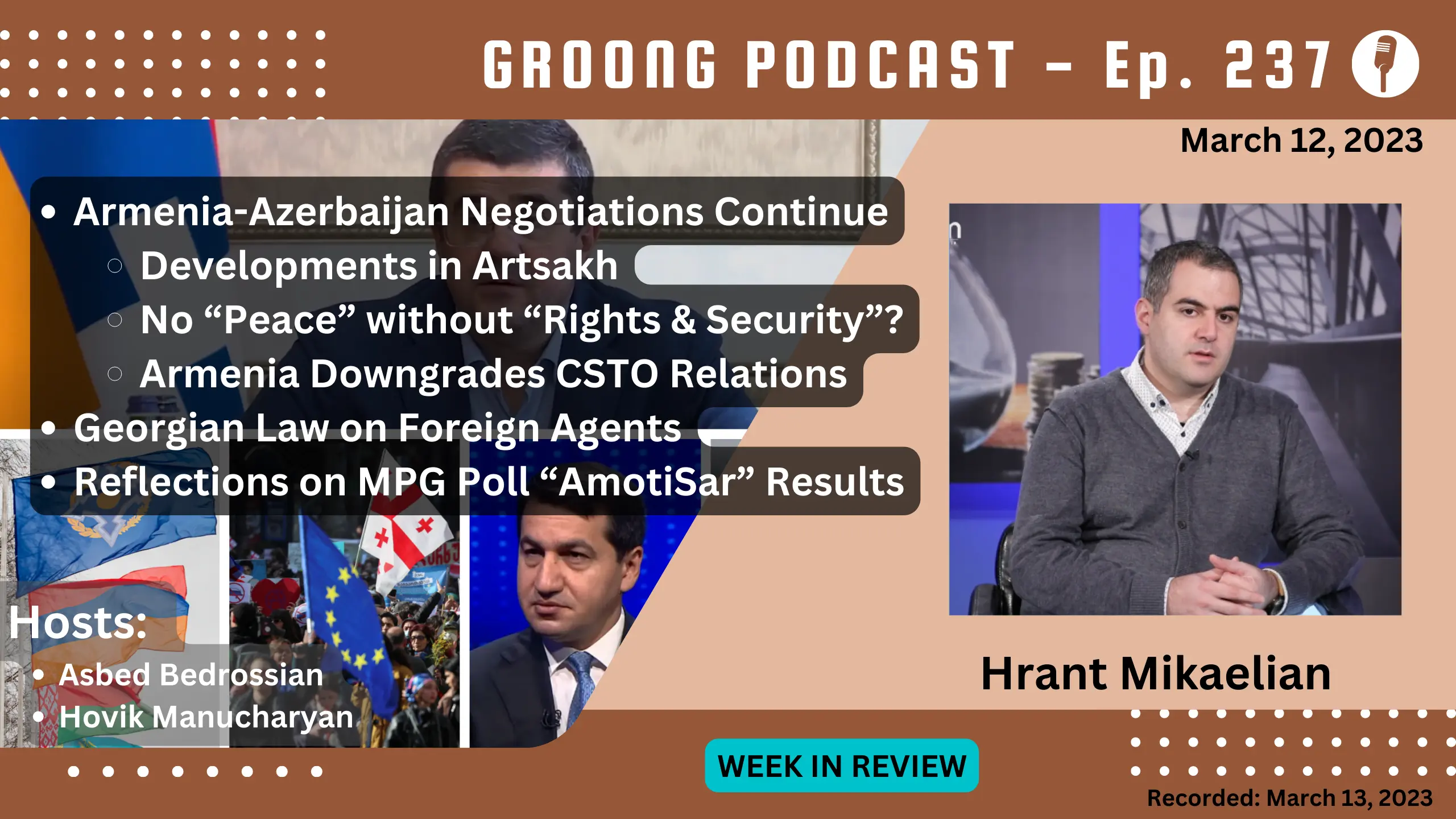
Guest:
Topics:
- Armenia-Azerbaijan Negotiations Continue
- Developments in Artsakh
- No “Peace” without “Rights and Security”?
- Armenia Downgrades CSTO Relations
- Georgian Law on Foreign Agents
- Reflections on MPG Poll “AmotiSar” Results
Episode 237 | Recorded: March 12, 2023
Show Notes
Armenia Azerbaijan Negotiations Continue
Developments in Artsakh
In Artsakh, the Azeri blockade continues, today was Day 92. We talk to Gev Iskajyan in Stepanakert every few days. We talked to him yesterday, to get a take on how things are on the ground over there.
As we know, on March 5 Azerbaijan attacked an Artsakh police car, in an unprovoked terroristic act. This was probably because Azerbaijan didn’t like what they heard from the Artsakh government, when they mischaracterized the meeting of the representatives of the two sides as being about “integrating Artsakh into Azerbaijan”.
Arayik Haruyunyan flatly denied that his reps discussed any integration topics, and said that Artsakh remains on its quest for internationally recognized independence. However, Harutyunyan also said that those who disagree with his government can try to change the policy within the legal framework provided by laws of Artsakh.
Many interpret Arayik’s statement to be directed at Samvel Babayan, who recently appeared in Artsakh and went on Artsakh public television to preach cooperation with Azerbaijan by supporting its goal of removing Russians from the region. Some in the opposition in Armenia and Artsakh criticize Harutyunyan’s statement for even allowing for a theoretical possibility that there could be forces in Artsakh who would favor integration with Azerbaijan.
Questions:
- Was Harutyunyan’s mention that those political forces who think otherwise, should self-organize, win elections and come take the government and change policy, - an “overton window”?
On Friday, Hraparak reported that Arayik Harutyunyan met with Pashinyan, who continued to press him to concede to integrating into Azerbaijan. Haruyunyan returned to Stepanakert, and has indicated to close circles that he continues to want to resign.
At the same time, an Artsakh parliament committee approved Harutyunyan’s proposal on constitutional changes, enabling parliament to select a president during times of martial law, to replace a vacant presidency.
- Why does Arayik want to resign? Initially the rumors were that he was being squeezed out by his state minister, Rouben Vardanyan. But if so, why would this situation continue since the sacking of Vardanyan three weeks ago?
Still why does Arayik want to resign still?
Follow-ups:
- Hikmet Hajiyev invited Artsakh authorities to go to Baku to negotiate on “re-integration”
- Unconfirmed news about the accumulation of Azerbaijani forces on the border with Artsakh.
No “Peace” without “Artsakh Security”
Following the Azeri shootings of three Artsakh policemen and wounding of another on March 5, this week security council chair Armen Grigoryan stated that Armenia’s understanding is that a peace agreement can not be signed “without progress on the Nagorno Karabakh issue”.
Questions:
- Who is Grigoryan’s intended audience? Is this statement intended for the domestic audience, or Azerbaijan, or The West?
- What does “some progress” mean? Does Grigoryan’s statement indicate a shift in Armenia’s negotiation strategy, or tactics? Or is this just posturing?
In response to today’s and previous Armenian statements about so-called “internationally visible” mechanisms for ensuring security, Hikmet Hajiyev, Ilham Aliyev’s assistant, responded: “Azerbaijan will not discuss issues related to its sovereignty with any third parties, including the Republic of Hayastan.”
Questions:
- So what now?
Armenia Downgrades Relations with CSTO
We’ve talked a lot on this show about Armenia’s relationships with Russia and the CSTO tanking. The latest on this downward spiral was on Friday, when Armenia further downgraded its relations with the CSTO by declining to assign one of the three deputy secretary-general positions.
The move was criticized by Tigran Abrahamyan, an opposition MP who is also on the parliamentary standing committee on defense and security.
Questions:
- What’s the significance of this move?
- Is there a bottom in sight, for these degraded relationships with Russia and the CSTO?
If Armenia were to effectively drop out of the CSTO, even if it officially remains in the alliance, the biggest concern is that there is no alternative security framework which it can rely on for its safety. The West operates in the South Caucasus through the arm of Turkey, which is an enemy. The same enemy that gave Pashinyan’s a kick in the butt in 2020, and to whom he can not refuse any concession.
The CSTO has not been a great deal, but it is part of the global patchwork of security alliances that keeps a multipolar balance around the South Caucasus.
Questions:
- What alternative is this ruling party betting Armenia’s future on?
Georgia Law on Foreign Agents
On March 7, the Georgian parliament voted into law one of a couple of drafts of a bill that had been circulated for the last few months. This bill was a near-exact translation of the US law on “Foreign Agents Registration Act”, known as FARA. The law would require political actors to clarify their foreign funding sources and their activities to lobby lawmakers with such funding.
The bill passed with 76 out of 150 votes, and it ignited large protests in Tiflis, and on March 9 the parliament agreed to rescind the law and to release arrested opposition members. The main backer of the bill was the ruling Georgian Dream party, although it was initiated by a splinter party called People’s Power. The main opponents of the bill: See the picture on this article. If we want to be more politically correct: the pro-western opposition.
Questions:
- Was this backdown a victory for the Georgian opposition?
- What were the reasons behind the vehement opposition to this bill by the west? The bill is a near-replica of a US law, the FARA. Why is it good for the US, and not good for Georgia?
The opposition protesters were heavily supported by Western NGOs, many of whom would be targets of the law. In addition, many EU and Western officials expressed an opinion on the proposed law.
The tactics used by the opposition in Georgia also raised eyebrows. On live TV we saw protesters throw molotov cocktails at the police, we saw them breaking public benches in order to make improvised barricades, and flipping over cars Yet, all we heard from Western politicians were calls to the Georgian government to ensure the right of protesters to protest peacefully.
Meanwhile, there were also more peaceful protests in Moldova from the opposition that were criticized by the west, which supports the ruling government there. Of course we remember the resistance movement protests in Armenia last summer where some western representatives even criticized the Armenian opposition for being too violent, despite the protests being nowhere near as violent as in Georgia.
Questions:
- Why did the opposition in Georgia succeed in making the government back down, while the opposition in Armenia didn’t?
MPG/Gallup International Poll
Perception of change in corruption since 2018
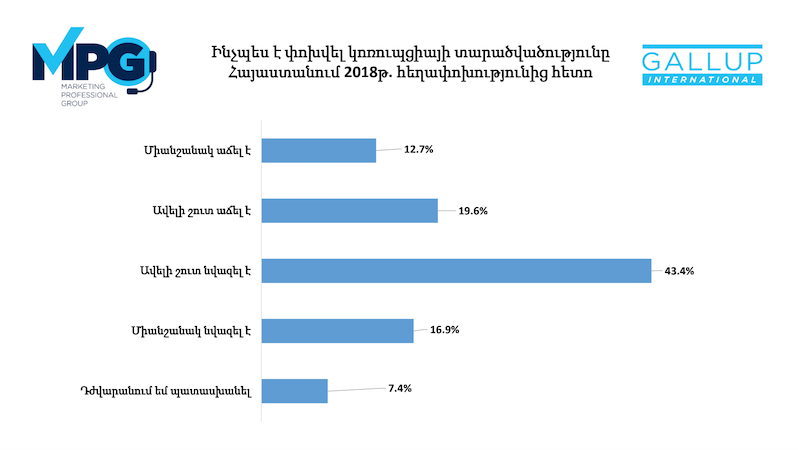
Perceptions on aid to Syria and Turkey
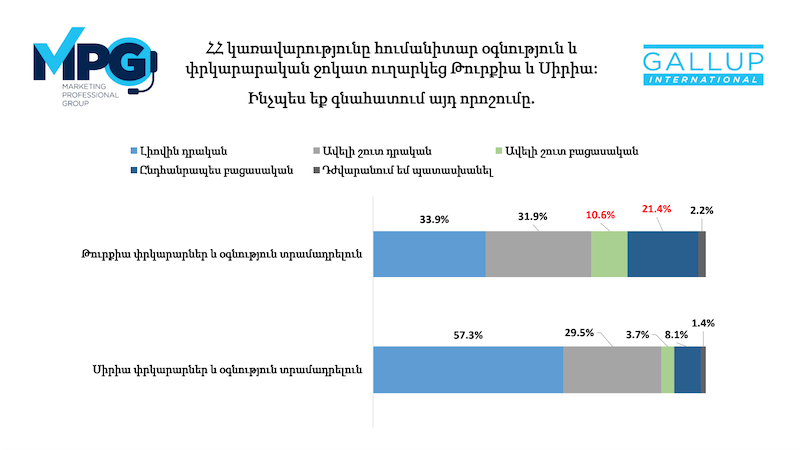
Low level of support in institutions and media and the police
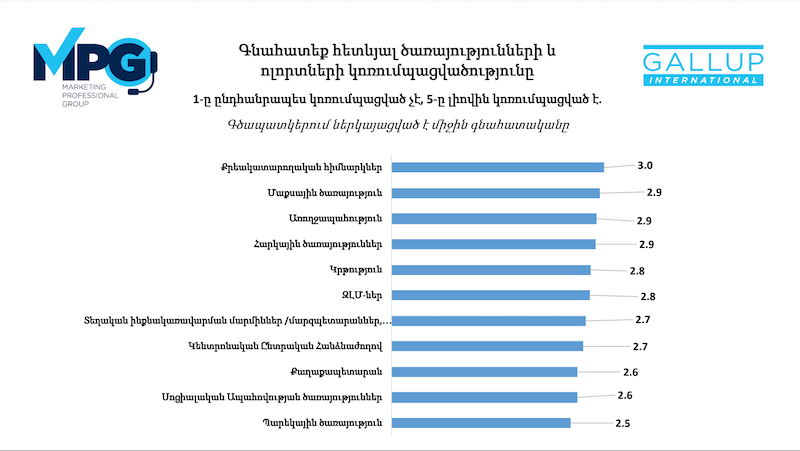
Trust in Pashinyan about the Fire in Military Barracks (>70% no trust)
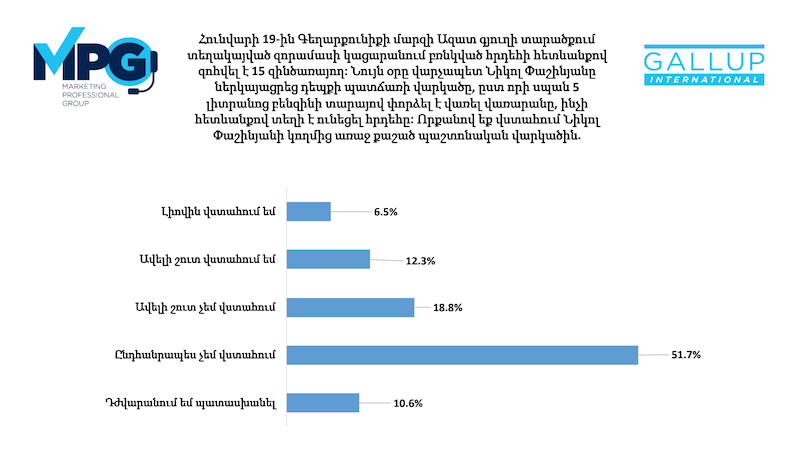
Change in perception about exploiting Amulsar
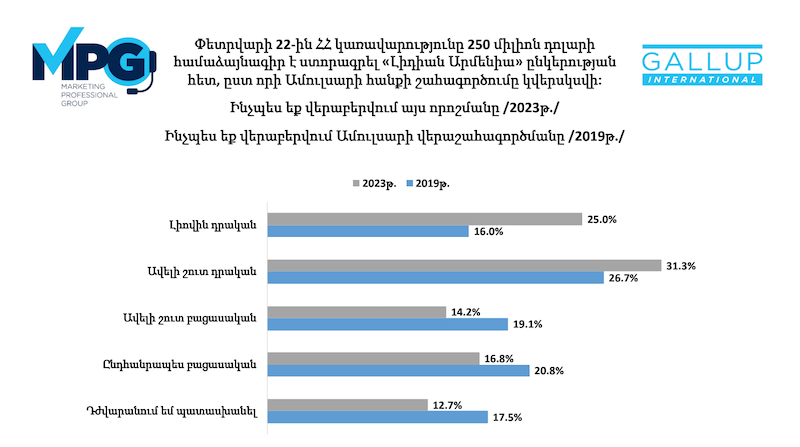
Alright, we’ll leave it there for today! Thank you everyone!
Wrap-up
We hope you found our Week in Review helpful. We invite your feedback and your suggestions, you can find us on most social media and podcast platforms. Thanks to Laura Osborn for the music on our podcasts.
Guests
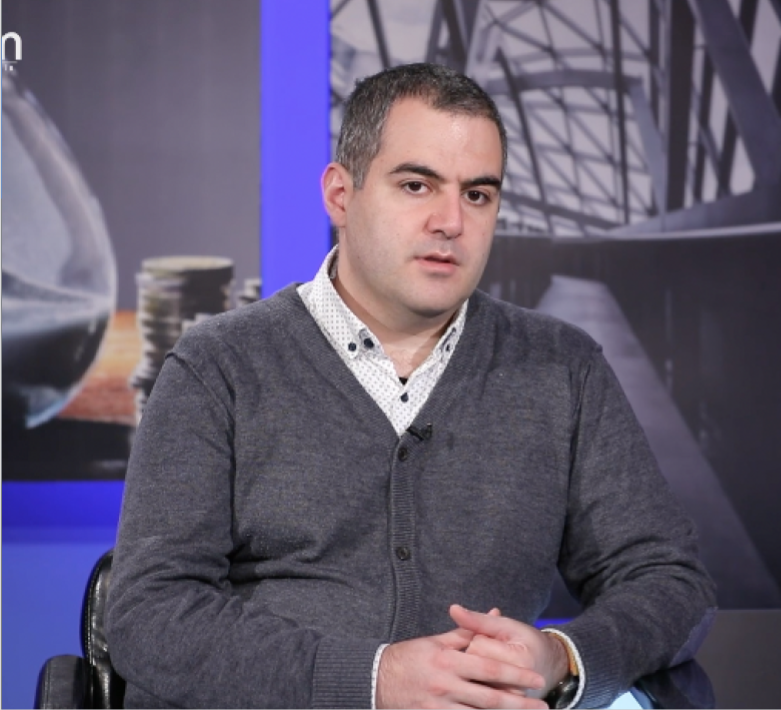
Hrant Mikaelian
Hrant Mikaelian, a political scientist and multidisciplinary researcher in social sciences based in Yerevan. He is also a senior researcher at the Caucasus Institute. Hrant is a co-founder of the Armenian Project.
Hosts

Hovik Manucharyan
Hovik Manucharyan is an information security engineer who moved from Seattle to Armenia in 2022. He co-founded the ANN/Groong podcast in 2020 and has been a contributor to Groong News since the late 1990s.
Disclaimer: The views expressed by Hovik Manucharyan on the ANN/Groong podcast are his own and do not necessarily reflect the opinions of his employer or any other organization.

Asbed Bedrossian
Asbed is founder of the Armenian News Network Groong and co-founder of the ANN/Groong podcast.